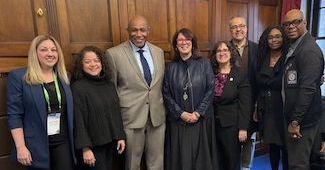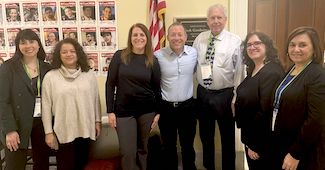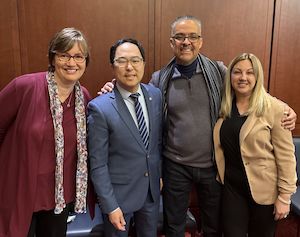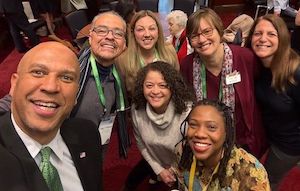Site Search
- resource provided by the Forum Network Knowledgebase.
Search Tip: Search with " " to find exact matches.
Hosted by United Philanthropy Forum, in partnership with the Council on Foundations and Independent Sector, Foundations on the Hill (FOTH) is an annual opportunity for foundation executives, staff, and board members, philanthropy-serving organizations, and other philanthropic and social sector leaders to meet with their federal lawmakers, talk about issues of interest to philanthropy, and strengthen relationships with their representatives.
The overall purpose of Foundations on the Hill is to:
- Inform and educate Congress about philanthropy
- Advocate on issues affecting foundations
- Build CNJG’s relationships with lawmakers and their staff
- Create visibility for foundations and philanthropy on Capitol Hill
- Encourage Congress to view foundations as resources on key public policy issues
CNJG Makes Strong Showing at Foundations on the Hill 2025
The Council of New Jersey Grantmakers joined over 350 colleagues nationwide at Foundations on the Hill (FOTH) from February 23rd to 26th. This premier policy conference brought together the philanthropic sector for advocacy and education.
The CNJG delegation, led by our President and CEO Theresa Jacks, included Board Chair Craig Drinkard, Executive Officer, Victoria Foundation, Policy Co-chairs, Lucy Vandenberg, Executive Director, The Schumann Fund for New Jersey and William Engel, President, The Union Foundation, as well as a diverse group of foundation leaders representing various regions and interests across New Jersey. Notably, Linda Czipo, President and CEO of the New Jersey Center for Nonprofits, also participated, providing valuable insights from the nonprofit perspective.
FOTH offered a rich program beyond meetings with legislators. Attendees participated in conference sessions, learned about key national trends in philanthropy, and engaged with experts on critical issues like equitable grantmaking, tax reform, and the budget reconciliation process.
The CNJG delegation met with all New Jersey Congressional and Senate offices, including meeting directly with Congressmen Josh Gottheimer and Herb Conaway, and Senator Andy Kim, along with a photo meet-up with Senator Cory Booker. They advocated for the bipartisan Charitable Act, H.R.801/S.317). These bills modify and extend the deduction for charitable contributions for individuals who do not itemize deductions on their tax returns, thereby incentivizing charitable giving and encouraging greater philanthropic support for nonprofits and the communities they serve.
Beyond policy discussions and sharing what is happening on the ground in our state’s communities as a result of executive actions, FOTH provided valuable networking opportunities. The annual CNJG dinner fostered connections and relationships within the delegation, as well as time to debrief about what we were hearing on the Hill. Special thanks to Jermey Grunin, President, Grunin Foundation and Bill Engel for underwriting our dinner!
Overall, CNJG's participation in FOTH proved successful. By advocating for key legislation, educating Congress, and building relationships, CNJG helps ensure the voice of New Jersey philanthropy is heard on Capitol Hill.
2025 CNJG Delegation:
Carrie Bersak, Program Officer, The Burke Foundation
Sharif Braxton, Director, EQUIP NJ
Naeema Campbell, Program Officer, The Fund for New Jersey
Linda Czipo, President and CEO, New Jersey Center for Nonprofits
Kortney Swanson Davis, President and CEO, Forman S. Acton Educational Foundation
Craig Drinkard, Executive Officer, Victoria Foundation
William Engel, President, The Union Foundation
Alma Garcia, Director, Equity Ahora
Jeremy Grunin, President, Grunin Foundation
Theresa Jacks, President and CEO, CNJG
Jessica Johansen, Manager of Portfolio and Strategic Operations, The Tepper Foundation
Sharnita Johnson, Vice President, Victoria Foundation
Jessica Nugent, Senior Program Officer, The Burke Foundation
Katherine Nunnally, CEO, Smith Family Foundation
Jonathan Pearson, Executive Director, The Horizon Foundation for New Jersey
Shelley Skinner, Managing Director of Portfolios, The Tepper Foundation
Nelida Valentin, Vice President, Grants & Programs, Princeton Area Community Foundation
Lucy Vandenberg, Executive Director, The Schumann Fund for New Jersey
Renee Woodside, Associate Director, The Horizon Foundation for New Jersey
Hellen Zamora-Bustos, Grassroots Community Advocate, Equity Ahora
In March 2024, Governor Murphy signed into law significant reforms to the ways that New Jersey enforces municipal affordable housing obligations under the state Supreme Court Mount Laurel doctrine. The new law creates enhanced affordable housing opportunities for New Jersey’s low-and moderate-income households, while seeking to streamline the affordable housing development process by setting clear guidelines for determining housing obligations. It is expected to reduce legal costs and judicial involvement. Join Adam Gordon, Executive Director and Emily Devenney, Grants and Development Manager of the Fair Share Housing Center for a conversation about what this new legislation means for philanthropy.
Since the revival and improved enforcement of the Mount Laurel Doctrine in 2015, New Jersey has seen a considerable increase in affordable housing production. However, there remains a substantial shortage of affordable homes in the state, particularly for very low-income residents. The legislation aims to address this gap by ensuring that every municipality contributes its fair share of affordable housing.
Key features of the legislation include a streamlined process for determining affordable housing obligations, codification of methodology for calculating these obligations, increased transparency in the housing development process, and the repeal of the state Council on Affordable Housing (COAH). Additionally, the legislation prohibits wealthy towns from avoiding their housing obligations through regional contribution agreements.
Cost: Free for CNJG Members; $50 for Non Member Grantmakers
Adam Gordon is the Executive Director of FSHC and leads FSHC’s coordinated strategy of organizing, litigation, and policy development to advance racial, economic, and social integration throughout New Jersey and the United States. Since joining the organization in 2006, he has worked to implement the Mount Laurel Doctrine which has created over 70,000 affordable homes in historically exclusionary NJ communities, litigated the largest federal fair housing case in American history, and worked to make federal disaster recovery policy more equitable. Under his leadership FSHC has secured the passage of the first statewide Fair Chance in Housing Act to limit discriminatory tenant screening policies and a landmark $305 million fund to accelerate affordable housing development. Gordon holds a B.A. and J.D. from Yale University.
Emily Devenney joined Fair Share Housing Center as the Grants & Development Manager in January 2024. She comes with experience in fundraising and community organizing, and strong connections to South Jersey, where she was born and raised (and likely will never leave). Emily has a B.A. in Economics and a Masters of Public Policy from the University of Massachusetts Amherst and a Certificate in Fundraising from Villanova University.
Webinar Video
CNJG joined over 350 delegates from across the country for Foundations on the Hill on February 23-26. The event included a policy conference followed by meetings on Capitol Hill. Our delegation was a nice mix of newcomers to FOTH and those with years of experience.
Joining me this year were Board Chair Craig Drinkard; Sharnita Johnson, Victoria Foundation; Board Secretary Kortney Swanson Davis, Forman Acton Foundation; Board members, Jeremy Grunin, Grunin Foundation, and Lucy Vandenberg, Schumann Fund for New Jersey; Bill Engel, The Union Foundation; Carrie Bersak and Jessica Nugent, The Burke Foundation; Sharif Braxton, EQUIP NJ; Naeema Campbell, The Fund for New Jersey; Alma Garcia and Hellen Zamora-Bustos, Equity Ahora (formerly New Jersey Health Initiatives); Jessica Johansen and Shelley Skinner, The Tepper Foundation; Sharese York, Smith Family Foundation; Nelida Valentin, Princeton Area Community Foundation; and Renee Woodside, The Horizon Foundation for New Jersey.
For the last few years, we’ve also been joined by Linda Czipo, President and CEO, New Jersey Center for Nonprofits. Linda’s voice elevates our conversations and helps ground them in the work nonprofits do every day.
Speaking with one voice, we urged our legislators to sign on to the bipartisan Charitable Act (H.R.801/S.317). Congressman Kean co-signed the bill on March 3, 2025. We also took the opportunity to share with our Congressional delegation how changes in federal policy and various executive actions are impacting nonprofits and the communities we collectively serve.
In advance of FOTH, the Center surveyed NJ nonprofits for the New Jersey Nonprofits Trends and Outlook 2025 Report – just released this morning! As part of their survey, they also asked for on-the-ground stories of impact in the face of federal funding freezes and actions from the executive branch. Here’s a sampling of what they heard and what we shared at FOTH:
“As of 2/12/25 our agency had not received over $1.5 million owed on federal contracts for work performed in December and January, and on 2/11/25 we furloughed 46 employees … There are currently 1,000 children in NJ who need services in the database for unaccompanied minors where our program staff are assigned cases…If staff are furloughed or laid off these children will not receive services.”
“It was terrifying--a payroll week. We were afraid that we would not be able to pay contractors for work they had already done. Our refugee assistance programs, which had just expanded, lost funding. We were afraid that we would not be reimbursed for $100,000 in disbursements … we had to let go 2 brand new staff members.”
“[Organization] receives federal funding administered by the state and counties (Aging funds and Ryan White funds). If we lose those funds, we will not be able to serve seniors in Ocean and Union County or people living with HIV in 8 counties in NJ.”
“Our federal grants comprise of about $900,000 in total. These funds are our main lifeline for our mental health counseling and sexual violence programming. Especially those who are already marginalized, underserved and/or at risk are more vulnerable to the funding uncertainties than any other groups…”
FOTH is always an opportunity for us to discuss issues of interest to philanthropy, advocate for policy and legislation that strengthen the philanthropic and nonprofit sectors and build relationships with legislators.
This year, we also had a moral obligation to ring the alarm and make sure our representatives understood how communities are being impacted by a wave of reckless and destructive policy decisions.
Earlier this morning, the Center presented their webinar, "The State of NJ’s Nonprofit Sector", providing a high-level review of the related report. Nearly two-thirds of survey respondents reported that at least some of their funding comes from federal grants or contracts which account for more than 4,500 jobs. These findings tell us that people’s lives and livelihoods are at stake.
The webinar provided a concise list of what funders can do during these especially challenging times:
- Check in with nonprofit partners.
- Provide flexible funding.
- Simplify applications and reporting processes.
- Connect nonprofits to information/guidance (Start here with Resources to Navigate Uncertainty).
- Fund advocacy.
- If possible, please increase your payout.
These recommendations align with Doing Good Better and so much of what we’re hearing from CNJG members and the broader philanthropic sector.
As foundation leaders dedicated to our New Jersey communities, please consider the full range of strategies your organizations can employ during these truly unprecedented times. Manager of Communications Shakirat Odunsi will collect stories from you, our members, about how you are changing/adapting your grantmaking and work in the face of the dramatic policy shifts that are happening in the executive branch. I also encourage you to share those stories directly with your CNJG colleagues via the listservs.
My colleague Linda ended the webinar with, “We are not alone. We can do this together!” And I’ll add - in fact, we must do this together.
In solidarity,
Theresa Jacks, President and CEO
Council of New Jersey Grantmakers
This research brief summarizes early findings from a survey commissioned by Enterprise Community Partners, Inc. to measure the ongoing impact of Hurricane Sandy, one year after the storm made landfall. Based on a representative sample of households in New York, Connecticut and New Jersey, this survey provides crucial insight into the long-term needs of those affected by the storm.
Resources gathered from our colleagues at other philanthropy-serving organizations, state nonprofit associations, and city, state, and federal governments.
Philanthropy Serving Organizations Resources
Candid: Funding Summary for Global Philanthropic Response
Center for Disaster Philanthropy
Disaster Philanthropy Playbook
Complex Humanitarian Emergencies: Philanthropy’s Role in Recovery Webinar - Held 2/13/2020
COVID-19 Coronavirus: How Philanthropy Can Respond Webinar - Held 3/5/2020
COVID-19: Past Epidemics and Vulnerability - Lessons for Funders Webinar and Webinar Slides - Held 3/26/2020
COVID-19: Making Effective Rapid Response Grants Webinar and Webinar Slides - Held 4/14/2020
COVID-19: Managing Multiple Disasters Amid the Pandemic Webinar - Held 4/28/2020
Report: Philanthropy and COVID-19 in the First Half of 2020 - May 2021
Report: Philanthropy and COVID-19 Measuring One Year of Giving - March 2021
Report: Philanthropy and COVID-19 Examining Two Years of Giving - May 2022
Center for High Impact Philanthropy: COVID-19 Pandemic: Resources
Council on Foundations
Philanthropy’s Response to Coronavirus Outbreak Resource Page
Sharing Approaches to COVID-19 Community Response Webinar and Webinar Slides - Held 3/12/2020
Funders: Sign the Council on Foundations’ Pledge to act with urgency, loosen restrictions, reduce what you ask of non-profits, contribute, communicate, and listen.
Exponent Philanthropy:
Resources for Lean Funders
Blog: How Lean Funders Are Responding to COVID-19
Funders Together to End Homelessness:
COVID-19 Response and System Redesign: Recommendations for Philanthropy to Support Solutions to End Homelessness
Grantmakers for Effective Organizations: Smarter Grantmaking Practices During—and Beyond—COVID-19
Minnesota Council on Foundations: Coronavirus Webinar and Webinar Slides - Held 3/4/2020
National Center for Family Philanthropy
COVID-19: Response and Recovery Resources
Family Philanthropy’s Response to COVID-19 Webinar - Held 3/27/2020
National Center for Responsive Philanthropy: Local Foundation Funding for Immigrant & Refugee Groups
Philanthropy New York
COVID-19 Updates & Resources
Preparing for COVID-19: Philanthropy’s Response in Times of Crisis Webinar - Held 3/12/2020
Philanthropy Network of Greater Philadelphia: Philanthropy’s Response to the Coronavirus
United Philanthropy Forum
3/12 Letter to Congress - Include Nonprofits in Coronavirus Package
3/18 Letter to Congress - Nonprofit Community COVID-19 Stimulus Letter
State Nonprofit Association Resources
New Jersey Center for Nonprofits: Resources for Non-Profits in Response to the COVID-19 (Coronavirus) Outbreak
1st Rapid Response Survey Report
2nd Rapid Response Survey Report
Washington Nonprofits: Open Letter to Funders
Government Resources
Center for Disease Control and Prevention: Coronavirus Disease 2019 (COVID-19)
City of Newark: News & Updates
Federal Emergency Management Agency: A Guide to the Disaster Declaration Process and Federal Disaster Assistance
NJ Department of Health: Up-to-date Information about the Coronavirus (COVID-19) in New Jersey
State of New Jersey: COVID-19 Information Hub
U.S. House of Representatives: House passes HR 6201: Families First Coronavirus Response Act
World Health Organization: Coronavirus disease (COVID-19) outbreak
Additional Resources
Condon O’Meara McGinty & Donnelly, LLP: Guidance for Private Foundations
Horizon Blue Cross Blue Shield of New Jersey, through its philanthropic arm, The Horizon Foundation for New Jersey, issued $555,000 in grants to 15 non-profit organizations for health, cultural programs and disaster relief throughout New Jersey during the third quarter of 2021.
The Foundation’s mission is to support organizations that make New Jersey healthier.
A total of $50,000 in disaster relief grants was awarded to the following organizations to support designated FEMA disaster areas and fill the gaps in the response effort:
- $25,000 to Community FoodBank of New Jersey
- $25,000 to ReNew Jersey: Ida Relief
Other grants issued in the third quarter include:
AtlantiCare Foundation, through the Community Foundation of New Jersey, in Morristown, received a $50,000 grant to support the Atlantic City Patient Transportation project, which provides free, easily accessible and reliable transportation for low-income patients in Atlantic City, using the health system’s services.
Diabetes Foundation, in Hackensack, received a $30,000 grant to support Improving Health Outcomes through Education and Guidance, a prevention and education program provided in English and Spanish, for patients with pre-diabetes and diabetes.
Food Bank of South Jersey, in Pennsauken, received a $25,000 grant to support Prevent T2, an evidence-based intervention for seniors designed to delay and/or prevent the onset of Type 2 diabetes.
Garden State Equality Education Fund, in Asbury Park, received a $25,000 grant to support the Adverse Childhood Experiences (ACEs) Self-Healing Community Model, which addresses the impact of trauma and ACEs on mental and physical health among LGBTQ+ and other marginalized communities in Camden.
George Street Playhouse, in New Brunswick, received a $75,000 grant to support the production of Anytown, a musical drama for students in grades 7-12, focusing on the challenges and consequences of opioid abuse and its impact on teens and families.
Greater Newark Health Care Coalition, in West Orange, received a $50,000 grant to support the Greater Newark Community Health Worker (CHW) Learning Collaborative, a project that promotes the growth, leadership and interconnections of CHWs in the Greater Newark region through monthly meetings, resource sharing and training.
Hopeworks ‘N Camden, in Camden, received a $20,000 grant to support Returning Stronger, which is focused on the development of a youth-built, youth-focused, easy-to-access website, to help young people find relevant mental health resources.
Mercer Council on Alcoholism & Drug Addiction, in Trenton, received a $20,000 grant to support the Community Oriented Recovery Effort (CORE), a pilot project to create and promote a larger, more inclusive space for those in the recovery community in Trenton and the surrounding area.
Millhill Child and Family Development Corporation, in Trenton, received a $20,000 grant to support Eat Right, Keep Moving, an obesity education and prevention program that aims to build a Culture of Health within the communities that Millhill serves.
Newark Boys Chorus School, in Newark, received a $40,000 grant to support the school’s music and concert touring programs, as well as academic initiatives.
The Newark Museum of Art, in Newark, received a $100,000 grant to support The Horizon Foundation Community Days, which occur once a month and provide free diverse programming for all ages.
Saint Vincent Academy, in Newark, received a $25,000 grant to support the Horizon Blue Cross Blue Shield of New Jersey Leadership Promise Scholarship, which provides one four-year scholarship to a Greater Newark-area student.
St. Benedict’s Preparatory School, in Newark, received a $25,000 grant to support the Steven Grossman Student Counseling Center, which provides students with mental health education, resources and services.
Community foundations are beginning to deepen and shift how they work, adopting an anchor mission that seeks to fully deploy all resources to build community wealth. Moving into territory relatively uncharted for community foundations, they are taking up impact investing and economic development — some in advanced ways, others with small steps. This report offers an overview of how 30 representative community foundations — including The Seattle Foundation, the Vermont Community Foundation, and the Greater Cincinnati Foundation — are working toward adopting this new anchor mission.
This Democracy Collaborative report was written by Marjorie Kelly, Senior Fellow and Director of Special Projects and Violeta Duncan, Community Development Associate.
Sample disaster preparedness and recovery plans for foundations.
Learn how you can register for events online, search the member directory for organizations and colleagues who have the same interests, and update your profile.
A CNJG corporate member asked for help with the scenario in which a corporate policy of not supporting religious organizations in their grantmaking, causes problems helping during a disaster in an urban or rural area, when the program that is delivering the disaster relief is based within a church. They want to work with those programs (a church serves as the program’s fiscal sponsor) who support efforts for hunger, homelessness, substance abuse recovery, racial equity, etc. as long as they do not discriminate and do no limit it to their own congregations. The request for policy samples to work around this religious organization hurdle as long as there is no discrimination or funding the actual church’s worship, was compelled by CNJG staff and is listed here.
The Newark Philanthropic Liaison is a unique partnership between the Council of New Jersey Grantmakers and the City of Newark, supported by several foundations. Read more about the Liaison’s work In these reports. Due to several transitions, there were no written reports between 2015 and 2022.
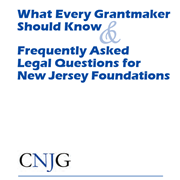
This guide was designed to help the state’s philanthropic community understand their ethical, legal, and fiduciary requirements and obligations.

Steering Committee
Jorge Cruz, Executive Director, LISC Greater Newark
Linda Czipo, President & CEO of the New Jersey Center of Nonprofits
Jackie Edwards, Executive Director, Parents Inc of NJ
Victoria Fernandez, Director of Thriving Communities, Grunin Foundation; and Co-Founder, Nonprofit Professionals of Color Collective
Tyneisha Gibbs, Founder and Principal Consultant of 144th & Vine; and Co-Founder, Nonprofit Professionals of Color Collective
Theresa Jacks, President and CEO, Council of New Jersey Grantmakers
Bridget Phifer, Chief Executive Officer, Parkside Business & Community in Partnership
Rosalía Velázquez, Director of Strategic Partnerships, New Jersey Center of Nonprofits
Advisory Group
Keith R. Adams, Executive Director, NJVOAD
Carin Berkowitz, Executive Director, New Jersey Council for the Humanities
Elsa Candelario, Professor of Professional Practice, Latino/a/x Initiatives for Service, Training, and Assessment, Rutgers School of Social Work
Jane Cohen, Executive Director, Governor’s Office of Climate Action and the Green Economy
René O. Deida, Director, Corporate and Community Engagement, Prudential Financial, Inc.
Hans Dekker, President, Community Foundation of New Jersey
Craig Drinkard, Co-Executive Officer, Victoria Foundation
Bill Engel President, The Union Foundation
Andy Fraizer Executive Director, Community Foundation of South Jersey
Laurie Goganzer, President and CEO, YMCA of Greater Monmouth County
Jeremy Grunin, President, Grunin Foundation
Bob Guarasci, Founder & CEO, New Jersey Community Development Corporation
Susan Hoskins, Executive Director, Friends Foundation for the Aging
Sharnita C. Johnson, Vice President of Strategy, Impact and Communication, Victoria Foundation
Elaine E. Katz, Sr. Vice President, Kessler Foundation
Eddie LaPorte, Director, New Jersey Office of Faith Based Initiatives
Taneshia Nash Laird, President and CEO, Newark Symphony Hall
Tammy Rice Herman, Director of Grants & Strategies, New Jersey State Council on the Arts
John Thurber, Partner, Br'Island Group
Keith Timko, Executive Director & CEO, Support Center
Sandra Toussaint, President & CEO, United Way of Greater Mercer County
Allison Tratner, Executive Director, New Jersey State Council on the Arts
Mark Valli, CEO, NORWESCAP
Margaret Waldock, Executive Director, Duke Farms
Catherine Wilson, President & CEO, United Way of Greater Newark
Doing Good Better, a partnership of the Council of New Jersey Grantmakers and the New Jersey Center for Nonprofits, is a community of funders and nonprofits taking action against the power imbalances and racial inequities in philanthropy, nonprofits, and government.

